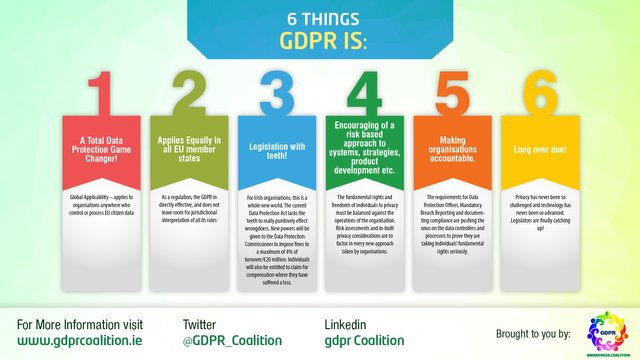What is the GDPR?
The GDPR (General Data Protection Regulation) seeks to create a harmonised data protection law framework across the EU and aims to give back to data subjects, control of their personal data, whilst imposing strict rules on those hosting and processing this data, anywhere in the world.
T he General Data Protection Regulation (GDPR) (EU) 2016/679 is a regulation in EU law on data protection and privacy for all individuals within the European Union and the European Economic Area. It also addresses the export of personal data outside the EU and EEA. The GDPR aims primarily to give control to citizens and residents over their personal data and to simplify the regulatory environment for international business by unifying the regulation within the EU.[1]
he General Data Protection Regulation (GDPR) (EU) 2016/679 is a regulation in EU law on data protection and privacy for all individuals within the European Union and the European Economic Area. It also addresses the export of personal data outside the EU and EEA. The GDPR aims primarily to give control to citizens and residents over their personal data and to simplify the regulatory environment for international business by unifying the regulation within the EU.[1]
Superseding the Data Protection Directive, the regulation contains provisions and requirements pertaining to the processing of personally identifiable information of data subjects inside the European Union. Business processes that handle personal data must be built with privacy by design and by default, meaning that personal data must be stored using pseudonymisation or full anonymisation, and use the highest-possible privacy settings by default, so that the data is not available publicly without explicit consent, and cannot be used to identify a subject without additional information stored separately. No personal data may be processed unless it is done under a lawful basis specified by the regulation, or if the data controller or processor has received explicit, opt-in consent from the data's owner. The business must allow this permission to be withdrawn at any time.
A processor of personal data must clearly disclose what data is being collected and how, why it is being processed, how long it is being retained, and if it is being shared with any third-parties. Users have the right to request a portable copy of the data collected by a processor in a common format, and the right to have their data erased under certain circumstances. Public authorities, and businesses whose core activities centre around regular or systematic processing of personal data, are required to employ a data protection officer (DPO), who is responsible for managing compliance with the GDPR. Businesses must report any data breaches within 72 hours if they have an adverse effect on user privacy.
Hi! I am a robot. I just upvoted you! I found similar content that readers might be interested in:
https://en.wikipedia.org/wiki/General_Data_Protection_Regulation